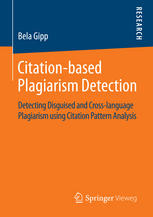

Most ebook files are in PDF format, so you can easily read them using various software such as Foxit Reader or directly on the Google Chrome browser.
Some ebook files are released by publishers in other formats such as .awz, .mobi, .epub, .fb2, etc. You may need to install specific software to read these formats on mobile/PC, such as Calibre.
Please read the tutorial at this link. https://ebooknice.com/page/post?id=faq
We offer FREE conversion to the popular formats you request; however, this may take some time. Therefore, right after payment, please email us, and we will try to provide the service as quickly as possible.
For some exceptional file formats or broken links (if any), please refrain from opening any disputes. Instead, email us first, and we will try to assist within a maximum of 6 hours.
EbookNice Team

Status:
Available5.0
19 reviewsPlagiarism is a problem with far-reaching consequences for the sciences. However, even today’s best software-based systems can only reliably identify copy & paste plagiarism. Disguised plagiarism forms, including paraphrased text, cross-language plagiarism, as well as structural and idea plagiarism often remain undetected. This weakness of current systems results in a large percentage of scientific plagiarism going undetected. Bela Gipp provides an overview of the state-of-the art in plagiarism detection and an analysis of why these approaches fail to detect disguised plagiarism forms. The author proposes Citation-based Plagiarism Detection to address this shortcoming. Unlike character-based approaches, this approach does not rely on text comparisons alone, but analyzes citation patterns within documents to form a language-independent "semantic fingerprint" for similarity assessment. The practicability of Citation-based Plagiarism Detection was proven by its capability to identify so-far non-machine detectable plagiarism in scientific publications.